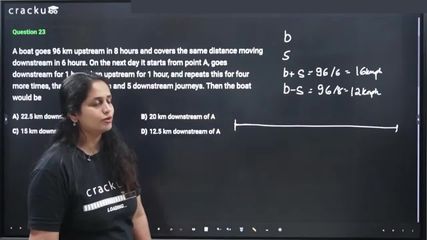A boat goes 96 km upstream in 8 hours and covers the same distance moving downstream in 6 hours. On the next day it starts from point A, goes downstream for 1 hour, then upstream for 1 hour, and repeats this for four more times, that is, 5 upstream and 5 downstream journeys. Then the boat would be
Solution
Let the speed of the boat be $$b$$ and of the stream be $$r$$, such that when the boat travels upstream, its speed is $$b-r$$, and when it travels downstream, its speed is $$b+r$$.
We now have $$\dfrac{96}{b-r} = 8$$ and $$\dfrac{96}{b+r} = 6$$. This gives $$b-r = 12$$ and $$b+r=16$$. Or that $$b=14$$ and $$r=2$$.
In one hour travelling downstream, the boat will cover $$(14+2)*1 = 16$$ kilometres. And in one hour travelling upstream, the boat will cover $$(14-2)*1= 12$$ kilometres. If the boat does this one after the other, it will effectively travel $$16-12=4$$ kilometres downstream.
The boat does this a total of five times. The distance it'll be from point A is simply $$4*5= 20$$ kilometres downstream.
Video Solution

Click on the Email ☝️ to Watch the Video Solution
Create a FREE account and get:
- Download Maths Shortcuts PDF
- Get 300+ previous papers with solutions PDF
- 500+ Online Tests for Free

